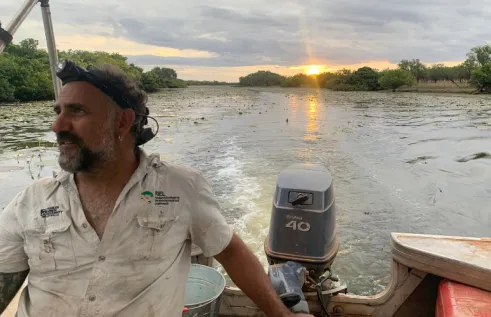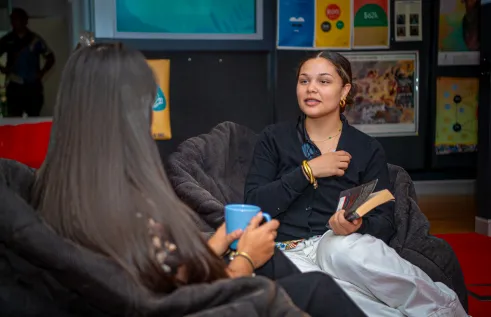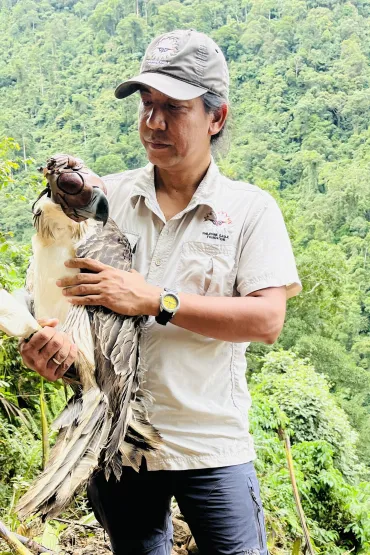RIEL seminar series
'Culture-based conservation' approach to supporting governance of Indigenous territories
| Presenter | Dr Jayson Ibañez (Philippine Eagle Foundation ) | |
|---|---|---|
| Date/Time |
to
|
|
| Contact person | E: RIEL.outreach@cdu.edu.au | |
| Location |
Savanna Room, Yellow 1.2.48 at CDU Casuarina Campus And online via Zoom (see below for Zoom link) All times are ACST |
|
| Open to | Public | |
Dr Jayson Ibañez is Director for Operations at the Philippine Eagle Foundation (PEF). He is also a Professorial Lecturer at the College of Science and Mathematics of the University of the Philippines in Mindanao, and an Adjunct Professor at the School of Environmental Science and Management of the University of the Philippines Los Baños.
Jayson received his PhD in natural resource management from CDU in 2015 through an Australian Leadership Award (ALA) scholarship. His dissertation on knowledge integration and Indigenous planning in the Philippines helped set up the PEF’s “culture-based conservation” approach to species and nature conservation in 2010.
Jayson has also pioneered research on the Philippine eagle’s (Pithecophaga jefferyi) home range, survival and habitat use through radio, satellite and GPS/GSM telemetry. His team has studied 31 eagles with trackers, which has improved scientific knowledge on this species which is listed as “critically endangered” by the International Union for Conservation of Nature.
He has received numerous awards for his work, including most recently the CDU International Alumni Award in 2023 and the Australia Alumni Excellence Award for the Environment in 2024.
Indigenous Peoples are crucial for the long-term persistence of the Earth’s biodiversity and ecosystem services. In the Philippines, the Indigenous Peoples Rights Act of 1998 protects Indigenous rights to own and manage territories. The forests of Indigenous territories are habitats of the Philippine eagle – a forest eagle that is endemic to the Philippines where it is a national bird and an apex forest predator.
Nearly 80% of the 2.8 million hectares of suitable Philippine eagle habitat overlaps with ancestral domains. The PEF has worked with nine Indigenous groups who have ownership over nearly 200,000 hectares of ancestral domains. Using the PEF’s culture-based conservation approach, four key elements of Indigenous governance have supported.
In this seminar, “‘Culture-based conservation’ approach to supporting governance of Indigenous territories: the case of nine Indigenous communities in the Philippines”, Jayson will discuss these key elements. He will also outline how the team combined Indigenous knowledge and scientific tools and techniques in community-based conservation and development, and helped build community social and human capital.
Through the fair engagement of culture-bearers in project implementation, research and conservation, the work has also generated psychosocial and financial empowerment. These efforts have resulted in clear biocultural conservation, political empowerment, and economic wellbeing outputs with Indigenous partners.
Related Events

Trophic dynamics of free-flowing tropical rivers
Colton Perna's PhD research explores how river flows and flooding shape freshwater fish communities in tropical rivers, using fatty acids to track how hydrology influences food webs and nutritional pathways. His findings highlight the critical importance of river flow and floodplain connectivity in sustaining productive aquatic ecosystems.
Read more about Trophic dynamics of free-flowing tropical rivers
STATE OF THE DIS-UNION: Media Literacy in the age of AI
The CDU Library is hosting a free panel discussion featuring Northern Territory journalists who will discuss media literacy, truth, and storytelling in the AI era. Attendees can learn how AI is transforming media, ask questions, and improve their understanding of navigating information in today's landscape.
Read more about STATE OF THE DIS-UNION: Media Literacy in the age of AI
Why Cross‑Cultural Communication Matters in Indigenous-focused Research
A cross‑cultural research partnership grounded in respect, shared knowledge, and educational equity. Discover how collaboration shaped a transformative PhD journey.
Read more about Why Cross‑Cultural Communication Matters in Indigenous-focused Research
